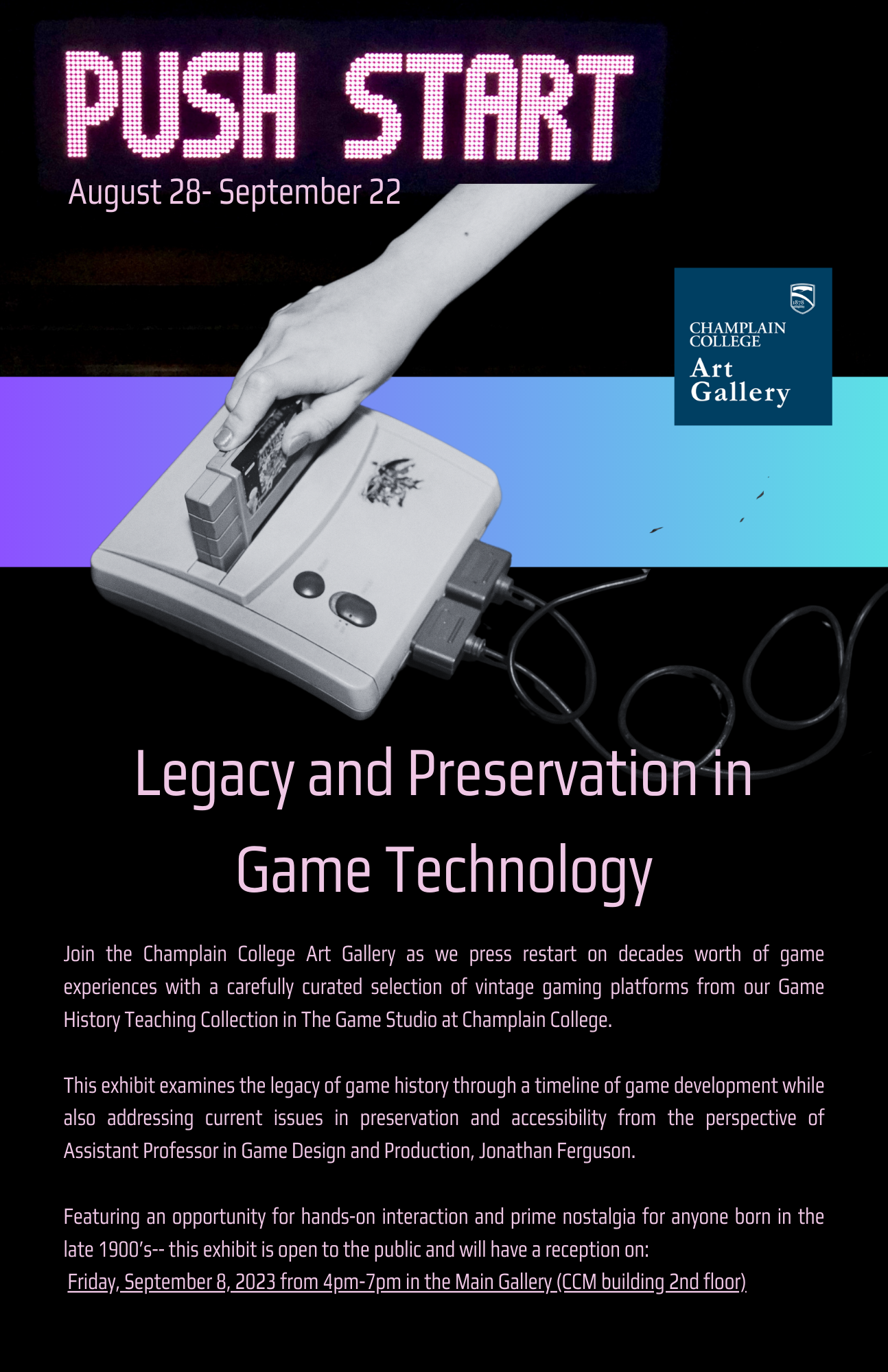
***Exhibition extended until September 29th***
In an era defined by rapid technological advancement, we find ourselves at the crossroads of innovation and nostalgia. Push Start is an exhibition that delves into the history of video games and game technology, seeking to capture the essence of a rapidly evolving digital world and the importance of preserving its legacy. Just as classical paintings and sculptures offer us insights into historical periods, video games hold a mirror to the evolution of technology and human creativity.
Each week, Push Start will rotate through a different set of game technology generations, inviting you to interact with modern game preservation platforms alongside the original artifacts. Artifacts are drawn from the Game History Collection in The Game Studio at Champlain College. Each exhibit station offers two sides: on one side we invite you to relive the moment of the original intended experience; on the other side play a contemporary preservation effort. In so doing, we aim to highlight some of the differences and challenges inherent in preserving a gameplay experience, from the player to the controller to the hardware to the software to the screen.
Push Start aims to share how distributed volunteer communities of preservationists work to capture gameplay experiences when the original hardware and companies who made these games and consoles fade to memory. Push Start especially spotlights the work of the MiSTer Project, which aims to recreate the hardware of past game consoles and computers using modern Field Programmable Gate Array (FPGA) technologies. The MiSTer Project represents many thousands of hours of effort by its distributed team of Open Source developers. For this reason, the playable MiSTer platforms are mounted on the walls, along with the wires connecting each piece, suggestive of the connections between members of the game preservation community.
While games now saturate the media landscape, games are often treated as transient experiences. Game preservation poses a menu of thorny technical and policy issues, yet, players often yearn to play games again, many years after their release. Without an ecosystem of manufacturers, developers, and preservationists, trying to play old games rapidly becomes impossible.
As technology advances, the preservation of game technology and history becomes increasingly urgent. Just as ancient manuscripts require careful restoration, so do digital artifacts. Thanks to the Game History Collection in The Game Studio at Champlain College, what you see here serves as an interactive reminder of the importance of archiving these virtual worlds and experiences for future generations, ensuring that the cultural and technological significance of video games remains available for study and play.
Jonathan Ferguson is an Assistant Professor of Game Design and Production in The Game Studio at Champlain College. A technologist, Ferguson’s diverse interests orbit the nexus of wireless communications, Amateur Radio, digital security, privacy, Free Libre Open Source Software and Hardware, Game Design, Photography and the deleterious consequences of surveillance capitalism. Ferguson recently founded the Game History Teaching Collection Restoration Laboratory, which aims to preserve and provide access to The Game History Teaching Collection of The Game Studio at Champlain College.
Week 1 (8/28 – 9/02) First and Second Generation
Week 2 (9/3 – 9/9) Second Generation * Reception Friday, 9/8, 4pm-7pm*
Week 3(9/10- 9/16) Third Generation
Week 4 (9/17- 9/22) Fourth generation
- Tags in this article
- Exhibitions
- GAME STUDIO